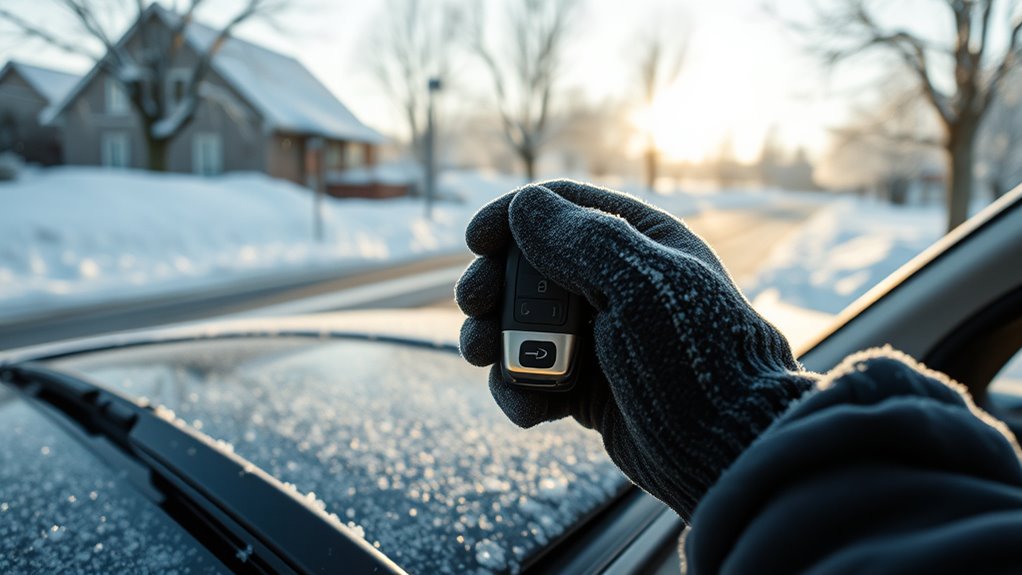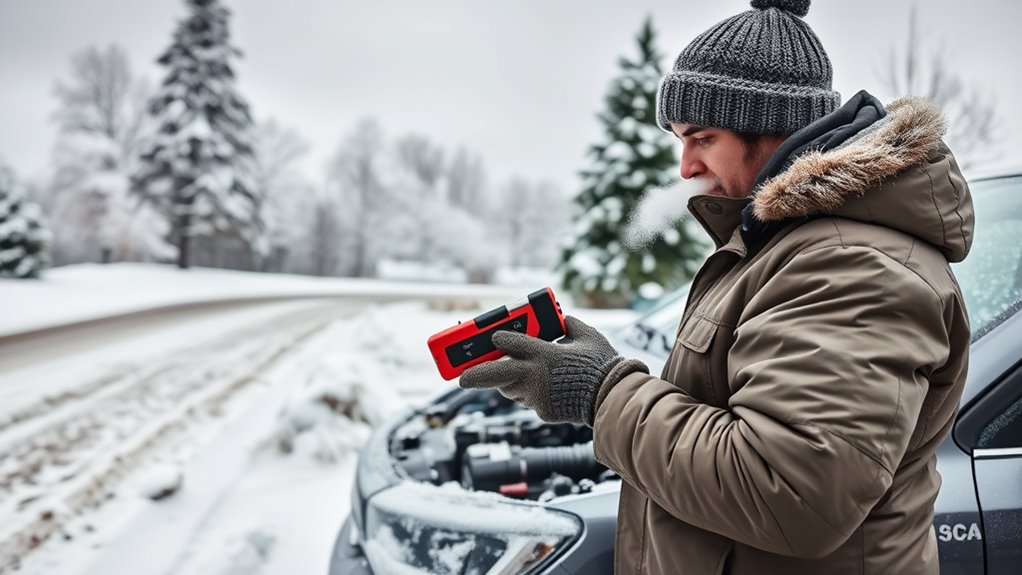To start your vehicle reliably in cold weather, keep your battery clean, tightly connected, and test it regularly, especially if it’s a few years old. Use winter-grade oil and keep your gas tank at least half full to prevent freezing. Consider a battery warmer or park indoors if possible. Maintaining proper tire pressure and warming up your engine helps it run smoothly. If you want more tips, there’s plenty you can do to prepare and stay safe.
Key Takeaways
- Keep your battery fully charged, check terminals for corrosion, and consider using a battery warmer or parking in a garage.
- Use winter-grade engine oil and keep your gas tank at least half full to prevent fuel freeze-up.
- Regularly test and maintain your battery and replace it if it’s over a few years old.
- Utilize winter-specific fuel additives and fuel system cleaners to prevent fuel line freeze and deposits.
- Warm up your vehicle for a few minutes before driving to improve fluid flow and engine response in cold weather.

Struggling to start your car in chilly weather? You’re not alone. Cold temperatures can make your vehicle’s starting process more difficult, but with a few simple tips, you can improve your chances of getting on the road smoothly. One of the most critical factors is ensuring your battery is in good condition. Cold weather substantially reduces a battery’s capacity, making it harder to deliver the necessary power to start your engine. Regular battery maintenance is essential; check the terminals for corrosion and ensure they’re tightly connected. If your battery is more than a few years old, consider having it tested to see if it needs replacing before winter hits. A healthy battery is your first line of defense against cold starts. Also, keep an eye on your battery’s fluid levels if it’s not maintenance-free—top it off with distilled water if needed, but avoid overfilling. Investing in a battery warmer or parking in a garage can also help maintain ideal battery temperature and prolong its life during the winter months. Maintaining battery health can significantly improve cold weather starts and prevent unexpected breakdowns.
Fuel system care is equally important when trying to start your car in cold weather. Low temperatures can cause fuel to thicken or even freeze in extreme cases, leading to poor engine performance or failure to start. To prevent this, use fuel additives designed for winter conditions—they help prevent fuel line freeze-up and improve fuel flow. Keeping your gas tank at least half full is a good practice, as it minimizes moisture buildup and reduces the chances of fuel line freeze. Regularly using a fuel system cleaner can also keep the injectors and lines clear of deposits that might worsen starting issues in cold weather. If your vehicle has a fuel filter, make sure it’s replaced as recommended, especially before winter, because a clogged filter can restrict fuel flow when it’s most needed. Maintaining a clean and efficient fuel system ensures that your engine gets the proper fuel mixture to ignite easily despite the cold.
In addition to focusing on your battery and fuel system, remember to check your engine oil. Thinner oil flows more easily in cold weather, aiding engine startup. Consider switching to a winter-grade oil if you haven’t already. Keep your tires properly inflated, as under-inflated tires can make starting and driving more difficult. Also, warming up your car for a few minutes before driving can help loosen up fluids and improve overall performance. These simple steps, centered around battery maintenance and fuel system care, can greatly increase your chances of starting your car effortlessly during winter’s chill. With some preparation and attention to these key areas, you’ll spend less time battling the cold and more time on the road.
Frequently Asked Questions
How Does Battery Age Affect Cold Weather Starts?
As your battery ages, its lifespan shortens, making cold weather impact more severe. Older batteries struggle to generate enough power to start your vehicle because their capacity decreases over time. In cold temperatures, this problem worsens since the chemical reactions inside the battery slow down, reducing performance. So, if your battery is nearing the end of its lifespan, expect harder starts in cold weather, and consider replacing it before winter hits.
Can Using a Block Heater Damage My Engine?
Using a block heater, when properly maintained, won’t damage your engine; it’s like giving your car a warm hug before a cold day. Regular block heater maintenance guarantees it functions safely, reducing engine damage risks. I once knew someone who skipped maintenance and faced costly repairs. Keep your block heater in good shape, and it’ll help your engine start smoothly without harm, especially during harsh winter mornings.
What’s the Best Way to Thaw a Frozen Fuel Line?
To thaw a frozen fuel line, you should first make sure your vehicle is turned off. Use a hairdryer or warm towels around the fuel line to gently heat it, avoiding direct heat to prevent damage. Applying fuel line insulation can help prevent future freezing. You might also consider using a fuel additive designed for cold weather, which can lower the fuel’s freezing point and keep the line clear.
Do Different Car Models Require Unique Cold-Start Procedures?
Did you know that over 60% of vehicle breakdowns in winter are due to cold weather? Yes, different car models often require unique cold-start procedures because of variations in vehicle insulation and engine design. You should check your owner’s manual for specific instructions, adjust tire pressure for ideal grip, and consider using a block heater if available. These steps help guarantee reliable starts regardless of your vehicle’s make or model.
How Often Should I Start My Car During Prolonged Cold Spells?
During prolonged cold spells, you should start your car at least once a week to maintain battery health and support engine longevity. Regular starts prevent the battery from losing charge and help circulate oil, keeping your engine in good shape. When starting, verify your battery is in good condition and consider using a battery maintainer if you’re away for extended periods. This simple routine ensures reliable starts and extends your vehicle’s lifespan.
Conclusion
Now that you’ve got these cold weather starting tips, you’re better prepared to face winter mornings. Remember, a little extra care can make a big difference in getting your vehicle running smoothly. Don’t let the cold catch you off guard—are you ready to start your day confidently, no matter how frosty it gets? Stay proactive, keep these tips in mind, and enjoy worry-free drives all season long. Your vehicle will thank you for it!









